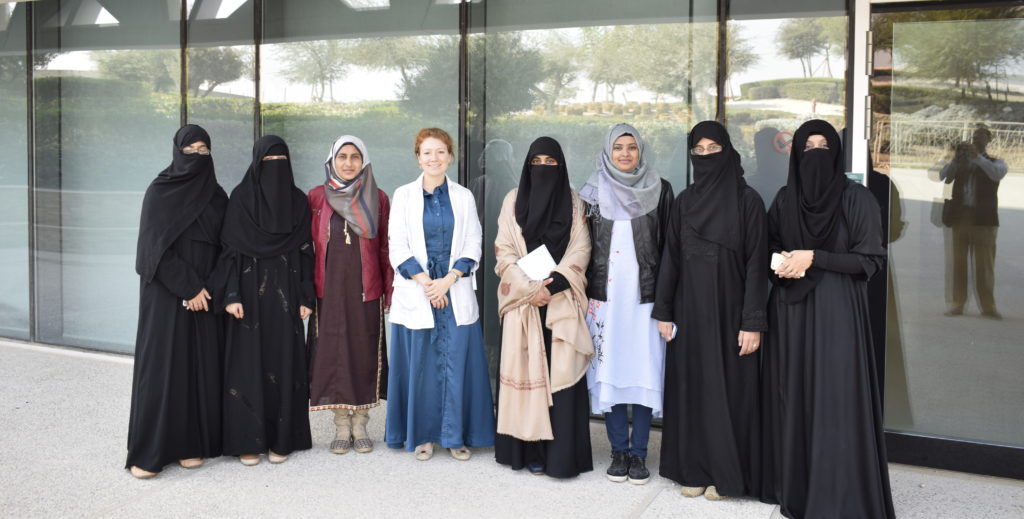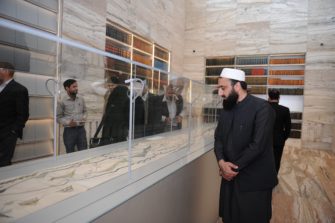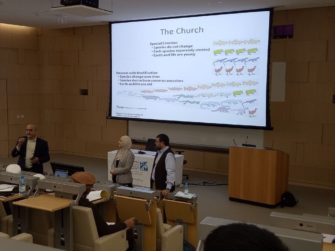
As we came out of the Hamad International Airport on the evening of December 24th, 2017, Doha seemed like a city under construction. Huge concrete structures and machinery rose up across the landscape along our way from the airport to our hotel near Education City. Coming from India, I wasn’t sure what to expect from an Islamic country. However, as the billboards around the construction sites invited onlookers to “think,” “discover,” and “innovate,” my fellow students and I knew that we were in for some pleasant surprises.
I was in Qatar to attend the week-long Madrasa Discourses Winter Intensive class. The Contending Modernities-housed project, which aims to develop scientific and theological literacy in madrasa graduates, selects students from India and Pakistan for rigorous semesters of in-depth coursework, discussions, and dialogue with each other and with undergraduate students from the University of Notre Dame. When I first came to know about Madrasa Discourses during the third year of my PhD in Islamic Studies at Jamia Millia Islamia in New Delhi, I did not hesitate to join the program because it offered a platform for serious engagement with Islamic religious tradition and provided an opportunity for Madrasa graduates to collectively rethink some of its aspects in a rapidly changing world.
In the course of this one week, we unlearned some of our long-held notions while building new experiences and gaining new insights into the relationship between religion and science, religion and language, as well as a deeper understanding of Islamic religious tradition. The lessons, including among others “Islam, Sustainability and the Environment” by Dr. Mohamed Khalifah; “Teaching Evolution in the Muslim World” by Jordanian Microbiologist Dr. Rana Dajani; “Homo-Deus and the Future of Humanity” with Professor Mahan Mirza; and “Hermeneutics, History, and Islamic Tradition” with Professor Ebrahim Moosa were extremely unsettling, but also simultaneously liberating.
The Urgency of Translation

Modern scientific theories of the Big Bang, evolution, genetic engineering, and other innovations pose challenges to a theology based on a geo-centric model of the universe which presupposes a fixed human nature. Islamic theology, which was developed in the classical period within the framework of Aristotelian logic, had a very different cosmology than the one constructed by modern scientific disciplines. Because this theology has not yet been translated across cosmologies, a deadlock has emerged between the proponents of modern human knowledge and Islamic theology, with the people on both sides rejecting the claims of those on the other side of the divide. Professor Mahan Mirza presented material emphasizing both the urgency and the inevitability of translating the tradition across cosmologies. As stated by Harari, “The single constant of history is that everything changes” (2017). History teaches us that alternate modes of thought and life have existed in the past and therefore current understandings and frameworks are not inevitable.
Harari gives the example of lawns, a European status symbol that has become widespread across the globe. Lawns have been imported to predominantly Muslim Middle Eastern countries as well, most of which happen to be arid. While there’s a hue and cry over importing supposedly “Western concepts,” such as democracy and secularism, we see almost no scholars raising an objection to maintaining lawns in the middle of a desert. For a just society, the aesthetic must go hand in hand with the ethical.
Theories of language by Izutsu, Ricour, Wittgenstein, Gadamer and Gardner introduced to us by Professor Moosa problematized our presumed notion of exact correspondence between human language and the natural world. The problems under discussion included:
- What are the origins of language?
- Does the language we use correspond to reality?
- What is the role of culture in language production?
- Why is it so difficult to translate concepts from one language to another?
According to Izutsu, during the time in history when humans had no language, they would experience all nature, everything around them, as one (2002). Izutsu calls it an undifferentiated whole. He adds that language begins to take shape when people start to categorize and divide things. People can divide reality in whatever way they like, giving rise to the vocabulary. As different cultures may categorize reality differently, the process of language production, through naming and categorization changes from one culture to another. People belonging to different cultures may look at the world differently and therefore form different categories. The language of a people therefore represents the world not as it is, but as they interpret it. Moral concepts, as a category of language, are similarly embedded in the worldview of the speakers of that language. As a result, it is difficult to translate a moral concept precisely from one language to another. This idea of human language created culturally runs counter to the dominant view in Muslim societies where language is thought of as created by God and having one to one correspondence with reality. This view gained currency due to the politics of the classical period of Islam, which were deeply linked with theological debates around the un-createdness of the Quran (which later became a bedrock of the orthodox Asha’rite theological position against the rational Mutazili).
A historical reading of Islamic tradition, however, reveals a more contested view of the nature of language and its relation to revelation, as shown by Moosa (2006, pp. 300-326). This observation may liberate Muslims to collectively re-think the nature of language and engage with their tradition more creatively to come up with the answers for some of the most pressing questions for Muslim communities across the globe today.
The centrality of the text of the Quran in Islamic religious tradition makes the assumptions about language theologically and politically charged. Naturally, “debates over language are prominent very early in the history of Islam” (Moosa 2006). During the session, Prof Moosa, speaking on hermeneutics and history, warned against two tendencies in particular:
- Negating the experiences of the people of the past
- Allowing the people from the past to negate our experiences
This will require us to step outside of our historical context to appreciate more fully the perspectives that held sway in the formative period of Islamic tradition, to distinguish the particulars from the universal values that were being implemented through those particulars and then to apply those values in our own time. Shifting one’s perspective, however, can be a tricky task.
Clay and Evolution

In just one minute, Dr. Rana Dajani showed us that we can be conditioned to look at a thing from a particular perspective, to the point we are unable to easily see other perspectives. How difficult would it be for someone conditioned to look at things in a certain way all their life to look at it through another lens? As the discussion on evolution ensued, we considered: How is it that Muslims are able to reconcile the idea that each human being is created by Allah and that everyone is born of a mother’s womb? Why is it that this reasoning cannot be extended to evolution? It can be unsettling for Muslims, including me, who have grown up reading the Quranic account of human creation in a particular way, to consider evolution as a valid explanation for creation of life. Yet a shift in perspective can reconcile the two seemingly opposing views of creation by an all-powerful God and biological evolution.
The image of creation of Adam in the Muslim psyche is that Allah made a human figure from clay and breathed His breath in the figure, bringing it to life. The everyday experience of believers will, however, show them that humans are born in a biological process quite different from the way they believe Adam was created. Yet the relationship between God and human remains the same as it was between Allah and Adam. The fact of a biological birth, from a single cell, that originated in unanimated matter, does not imply for Muslim theologians that the intervention of Allah in the creation of humans after Adam is any lesser. As Adam was fully created by Allah, so is every other human being, irrespective of their biological birth. Moreover, the creation of a figure from clay, its perfection and the breathing of life into it is all visualised as taking place in one definite moment in time. In ordinary human life, however, it is impossible to identify any one moment as the moment of creation, as a human being is constantly growing, developing, ageing, decaying with a million biological processes going on within its body at once in every moment. One must add to that the cognitive development of the individual. The picture which emerges is far more complex.
In my opinion the problem here is that humans have visualised the Quranic account of Adam’s creation as they themselves create objects, which do not grow or develop rational faculties, have emotions and experiences or reproduce. In order to reconcile evolution and Islam, we need to rethink our idea of God’s intervention. Rather than perceiving God’s intervention as the impact of a hammer, dramatic and contained in a moment, it has to be visualised like an intervention that flows through everything.
The sessions with Professors Waris Mazhari and Ammar Khan Nasir, lead faculty from India and Pakistan, respectively, engaged us with the readings on al Ghazali, Ibn Taymiyyah, Shahrastani, and other classical scholars of Islamic tradition, and revealed that we are not alone in trying to reconcile our experiences, our understanding of the natural world, as well as our social realities with our interpretations of revelation. Historical Muslim scholars too have made efforts to reconcile reason and revelation. They faced similar dilemmas and made their own moral choices. An engagement with historical Islamic tradition helps demystify the ways to make it forward looking and robust enough to provide a coherent theology and ethics to Muslims living in a rapidly changing and multicultural world.

